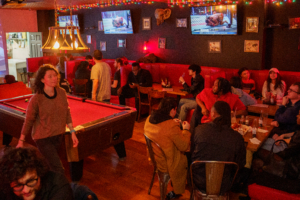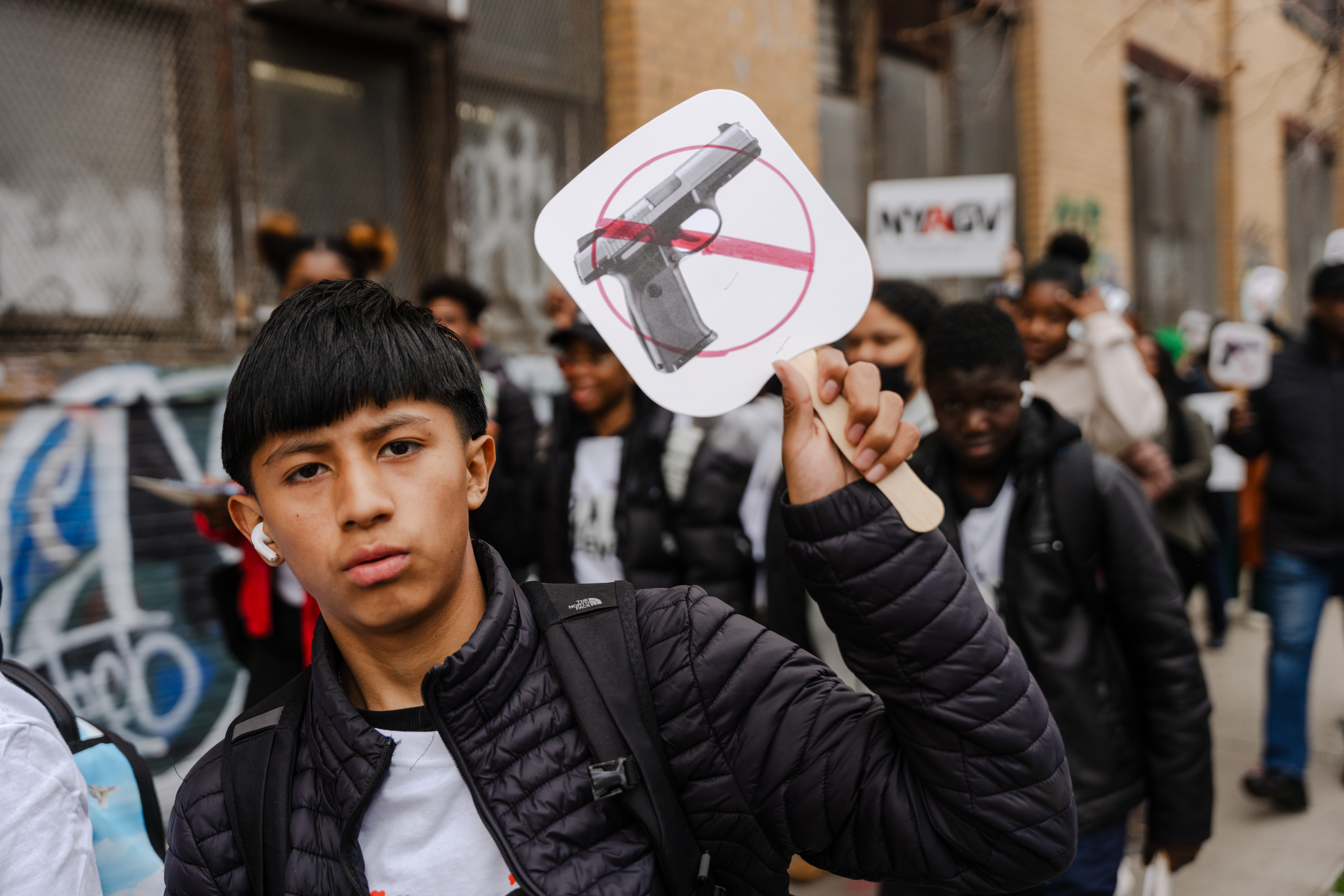“If it ain’t broke don’t fix it, right?” Sam Saverance tells me. He’s the co-founder and owner of the Bunna Cafe and, these days, he says his maxim is: “don’t mess with a good thing.”
It’s been a little past ten years since Bunna carved out its own a little vegan slice of Ethiopia in the heart of Bushwick, right around the intersection between Knickerbocker and Flushing Avenue. When Bunna (pronounced boo-na) opened, there were few other storefronts along the street. On top of that, there were few Ethiopian restaurants in all of the city, let alone a vegan one.
“When we started we were the only vegan Ethiopian restaurant in New York and as far as I researched, only the second one in the entire U.S,” says Saverance. “There were about a dozen [other] Ethiopian restaurants in New York City, mostly in Harlem and the Village.”
A decade and a few iterations of Bushwick later, it remains remarkable that Bunna has barely changed. The same menu, for ten years. At first, it was all about getting the Ethiopian coffee out there.




“Everyone drinks coffee,” says Liyuwork Ayalew, who had worked as a tour guide back in Ethiopia. Ethiopia is considered the birthplace of coffee, where drinking it is considered a cultural practice. It had been the main idea behind Bunna; the word means coffee in Amharic.
Saverance and Ayalew met at a coffee shop in Union Square back in 2011. Saverance had just returned from living in Africa where he had tried and failed to invest in some businesses there. Instead, he became fascinated with Ethiopian food and culture. Ayalew, who is Ethiopian, was in New York as an architecture student and worked, then, as a manager of a Think Coffee near Union Square.
“I want to show the good things about Ethiopia because everyone always knows about the problems,” Ayalew told me. “People mostly talk about the famine, war in Ethiopia. We have those things, but we also have good things, so I was interested in doing something that celebrates the good things that are going on in Ethiopia.”
Saverance, who’s been living in Bushwick for 18 years, suggested that the pair bring the concept to pop-ups and dinner parties on the rooftops of lofts in the area. Eventually, Ayalew’s friend Kedega Srage, who learned to cook from being in a big family but had no experience working in kitchens, came on board to run the restaurant. “She has a wholesome way of cooking,” says Ayalew.


Saverance and Ayalew say that settling on vegan cuisine was an easy choice, though neither are vegan themselves. Sirage, on the other hand, is vegetarian.
“It’s been around for a really long time, there’s been hundreds of years worth of development for this cuisine. It’s really good, it’s not substituting for anything and it makes you feel really satiated,” Saverance told me.
After a stint at Smorgasburg, they expanded to a commercial kitchen in the local southern restaurant and bar Mama Joy’s where they served lunch. After Mama Joy’s closed down in 2013, Bunna took over the lease. That November, they opened as Bunna at the current location.
There’s an atmosphere at Bunna that’s casual yet austere, Bushwick yet Ethiopian.
“If you go to Bunna now, you get the same energy as I did back in 2013,” says Delphine Diallo, a local photographer and Bunna regular, who describes the restaurant’s ambiance as “welcoming” and “very soft.”
By then, Diallo, who is French-Senegalese, had been living in Bushwick for about four years. In the 2010s, the Bushwick scene was dismal. Diallo recalled that aside from Northeast Kingdom, a farm-to-table American restaurant, there was nothing else.
“When I moved to Bushwick, I literally chose a place where nothing was happening. It was close to the city on the L train, like seventeen minutes from Union Square, but there was not much to the neighborhood outside of one restaurant,” said Diallo. “Outside of the Mexican and Puerto Rican neighborhoods, nothing around, it was a desert.”
When Bunna arrived, it drew in a community around its coffee ceremony, curation of music, and the regular line up of artists and DJs. There was something else too.
“When I discovered Bunna, I felt like I was traveling to Ethiopia. When I enter the restaurant, I feel like I’m in a different world and few restaurants can make you feel that way,” said Diallo.
Ayalew had designed the wall behind the bar and told me he was inspired by inspiration from the thirteenth century monolithic churches of Lalibela in Ethiopia. The wooden squares on the wall closely resemble the windows of rock-hewn churches.
Beyond the architecture, the space was always filled with music. Bunna frequently hosted musicians from all over Africa to perform, including Fendika, a well-known music group based in Addis Ababa. Ayalew tells me there is a small Ethiopian community in New York, mainly based in the Bronx that would come together at Bunna for this.
“For me to have an African diaspora place in Bushwick was so good,” Diallo added. “It wasn’t just me, it drew the diaspora and people not in the diaspora,” he told me.
The biggest changes happened over COVID. Bunna went from cash only to taking credit card. The prices went up too.
“I think escalating rents pushed out a lot of our old customers. Like a lot of restaurants, we’ve also had to raise prices a lot since COVID,” says Saverance. “I mean, we were deliberately underpriced before that because we wanted people to just come and have a good time,” he adds. They’re still selling the same nine familiar stews with each their own punch of flavor, to be scooped up by the soft and fluffy injera. The samosa is a must have too, says Bingbour.
For the most part, consistency is otherwise still at the heart of Bunna. Aboubacar Bingboure, who has been working there since 2017, told me that he came to New York to get a masters degree in database management, which was when he started working as a server at Bunna. In the years since, he’s now a manager at Bunna while still working a remote gig as a database manager.
He told me that initially Bunna was an opportunity for him to interact with customers and learn English, but he soon became immersed in the family dynamic there. “This kind of family, you cannot even tell if you are at home or at work because we are a family. After work, we make food for everyone, eat together, and organize barbecues,” he said. “You don’t think you are working, you are living in a family too.”
“It feeds the soul,” adds Ayalew. “There is passion in what we’re doing. That’s why we don’t expand, we want to do this right.”
Bunna Cafe is located at 1084 Flushing Avenue. Catch up with its hours on its Instagram page.
Photos by Rachel Lu for Bushwick Daily.
For more news, sign up for Bushwick Daily’s newsletter.
Join the fight to save local journalism by becoming a paid subscriber


